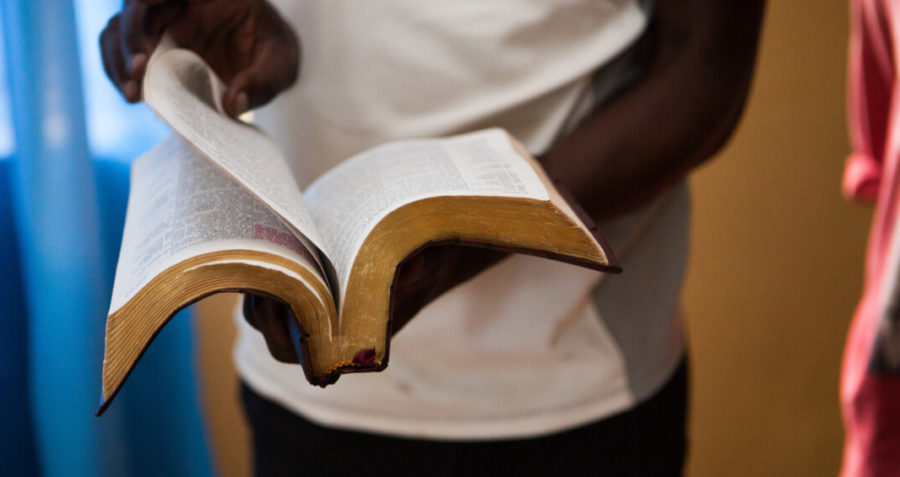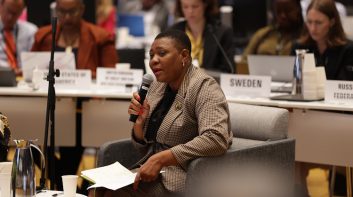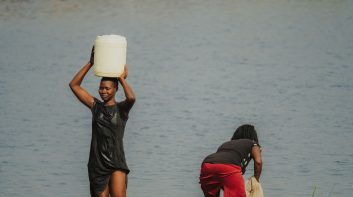Eswatini: ‘Is it a crime to love someone?’
 © Frontline AIDS/Gemma Taylor 2017
© Frontline AIDS/Gemma Taylor 2017
In Eswatini, nowhere does the lack of respect shown to people because of their sexual orientation go deeper than in religious circles. Imagine then what would happen if a pastor himself was discovered to identify as bisexual.
Same sex relationships are illegal in the world’s last remaining absolute monarchy which, despite vociferous protests, saw its first ever lesbian, gay, bisexual and transgender (LGBT) Pride event held two years ago.
However progress on equality for LGBT people remains slow, as former sugar cane industry worker James*, 37, who is a pastor and identifies as bisexual, can testify. “I was forced to marry,” he says. “It’s the rules of the church. So I took this decision to marry because I wanted to be a pastor. I can’t lead a church without a wife because the pastor must be an example.”
Chased out of the church
Church pastors sometimes talk about “healing” gay people through prayer and some members of the LGBT community have been excluded from their place of worship. For James, his life started to unravel when rumours began circulating that he was gay, following a purported audio recording of him saying: “I love you, is it a crime to love somebody?” to another man.
“My wife told the media about me. I think she was trying to get revenge,” he sighs. The church elders subsequently suspended him from “ministering the word of God” and the situation worsened when the newspaper article was published.
“Some church members followed me,” he says. “They chased me out of the church and then they took everything that I had – they took the house, the furniture, everything. I felt like I wanted to kill myself. One of the members of the church took me to her home and hid me so that they couldn’t find me. I did not report the incident to the police because of shame.”
Funding to help those in emergencies
Three months later, the sympathetic member of his congregation was herself threatened for helping him. Fortunately, the non-governmental organisation Health Plus 4 Men had read about James’ plight and managed to track him down to offer support via a Rapid Response Fund emergency grant from Frontline AIDS.
“Health Plus gave me the money to rent a place,” explains James, “and the capital to start my business. They gave me classes for business and now I have a restaurant, like a tuck shop, I’m selling food. Health Plus also referred me to the psychologist; it’s really helped me, now I feel good. The difference the support has made is that I now accept myself and I can live my life.”
James has also started up his own church and continues to be a pastor. “I wasn’t in a good way but now I’m starting a new life, it’s going well, I think I will be okay,” he says. “To be free, I’ve learned that the first thing is that you must know yourself, don’t force things like if you want to please the church or to please people. Be yourself.”
He chuckles when asked whether he’s in a relationship at the moment. “Now I’m afraid because I think I will find myself in hot water again,” he says.
A safe haven
This tiny landlocked country formerly known as Swaziland has a population of just over a million people, living for the most part in small rural communities. Despite its diminutive size, it has the highest HIV prevalence in the world and more than a quarter of the adult population is living with the virus. Stigma and self-stigma prevent many in the LGBT community from being tested or seeking HIV prevention, treatment and care services.
Sibusiso Maziya, executive director of Health Plus 4 Men, says: “My house was always packed with LGBT people and this colleague told me that there is a fund that can assist you to support them. They used to come to the office and we would listen to their stories, and there were so many stories of the LGBT community trying to kill themselves just because of their sexuality. Nobody was taking care of those people or paying them any attention.”
Health Plus 4 Men’s project officer Sakhile says the Rapid Response Fund has helped the organisation to create a safe haven in an extremely hostile environment. “Now our LGBT members find a warm welcome to assist them with the issues they face from the community at large. There’s a lot of discrimination, hatred and stigma that comes from society so when they come into our offices or come to events that have been facilitated by us, they feel at home, they feel safe and they are able to open up during our psychosocial support sessions. They are also able to share their stories and ask for help where needed,” he says.
Lack of rights for LGBT people
“This country is literally a vacuum when it comes to legalisation of LGBT rights,” Sakhile goes on to say, “and it is a country that is dictated by culture and religion so almost everything is against their existence.”
Sibusiso adds: “Our religion is against homosexuality. In our country if you have a child who is homosexual, you as the parent are discriminated against by the community. It’s a Christian country and in Christianity they say that being LGBT is a sin, that they are demons who are possessed and who will go to hell.”
As well as providing psychosocial support and business training from mentors, Health Plus 4 Men runs a regular health clinic for LGBT people to access HIV services and stock up on condoms and lubricant. The clinic plans to distribute dental dams for lesbian women in the near future.
The Health Plus 4 Men team is determined to tackle the underlying drivers of prejudice against the LGBT community in Eswatini. “We want to sensitise institutions like the military,” says Sakhile, “and we also want to sensitise community and religious leaders. We would then have targeted the religion and culture of the country which are at the root of stigma and discrimination.”
*name changed
About our programme
Health Plus 4 Men has been assisted by a grant from the Rapid Response Fund, which is managed by Frontline AIDS and funded by the Elton John AIDS Foundation. The Fund makes grants to LGBT and MSM organisations so that they can carry out urgent work to alleviate the stigma, discrimination and violence that threaten provision, access and uptake of HIV services for MSM and LGBT people.
Further Reading
Tags
Human rightsLGBTRapid Response FundSexual and reproductive health and rights (SRHR)




